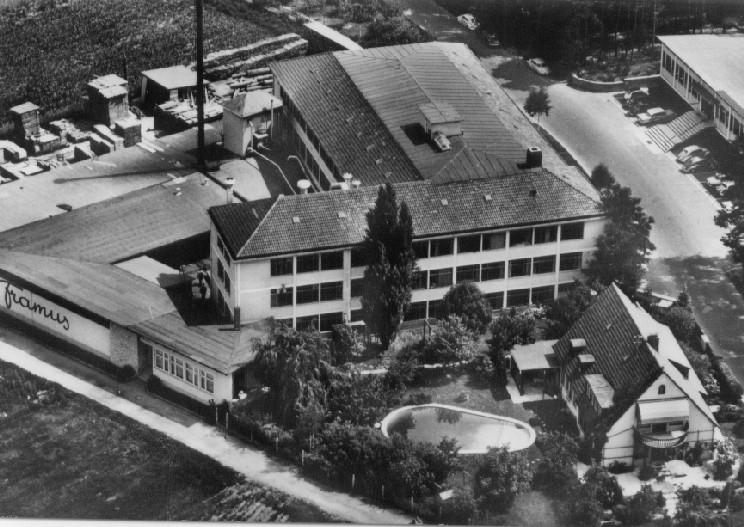Entrepreneur and Visionary – Fred Wilfer’s 100th Birthday
The Bubenreuth manufacturer Fred Wilfer played a central role in the development of the musical instrument manufacturing industry in Bavaria after the Second World War. On January 2, 2017 Wilfer would have turned 100 years old. He was born in Waltersgrün, a small Egerländer village near the music town Schönbach in the Saxon-Bohemian „Musikwinkel”. He is one of the fathers of the „Schönbacher Geigenbauer” in Erlangen. With his creative ideas and far-sighted visions, he was unique in the circle of European guitar manufacturers.
Fred Wilfer’s „Franconian musical instrument production” (Framus) is the first Sudetes-German company in Bavaria. It was founded on January 1, 1946 in Erlangen. In the autumn of 1945, young trade academician Wilfer was commissioned to carry out the settlement of the „Schönbacher Geigenbauer” in cooperation with the local refugee commissars in Erlangen. Wilfer took care of granting permits, housing assignments, furniture, raw materials for instruments and the sale of finished products. His efforts enabled many Schönbach families to start a new beginning in Franconia and represent the immediate prehistory of the Frankish Center for Musical Instrument Construction in Bubenreuth from 1949 onwards.
Fred Wilfer’s „Framus”, which moved in 1954 to Bubenreuth into a new factory building, soon became a world concept. Since the beginning of the 1960s, Framus has become the largest European guitar factory. Around 400 employees worked here, and around 1968 ca. 150,000 stringed instruments were sold every year with the label „Framus, Built in the Heart of Bavaria”. The one-millionth guitar was proudly presented at the 25th company anniversary in 1971. Guitars and basses weren’t the only products made in the Framus factories which was extended by a branch factory in Pretzfeld. The wide assortment ranged from violins, cellos and contrabasses over banjos, mandolins, ukuleles, and zithers to Hawaii and pedal steel instruments. Among other products such as strings, pickups and amplifiers belonged to the vast range. Even „Giannini by Framus” brand drums were produced in Bubenreuth.
However, this spread of the forces proved problematic over time. Investments had to be made in many areas in order to keep up to date. At the same time, the guitar market was hard-fought by the end of the 1960s by the appearance of a wide range of competitors. American guitars have secured the upper segment of luxury instruments, while Japanese companies that have penetrated the established markets all over the world have increasingly supplied the low-budget goods.

A reduction of the company was not an issue in view of 30-year manufacturing veteran, Fred Wilfer. Instead, he encountered the crisis offensive, for example through the advancement of his musical early childhood program. He also did not give up the fight with the Japanese instrument makers around the lower price segments of the guitar market. However, in view of wage developments and rising production costs in Germany, this race could not be won. As early as 1969 a drop in turnover of 20 percent was recorded and the situation worsened from year to year. Too late, Fred Wilfer switched to the production of high-quality musical instruments, which could compete with international top guitars. The company was further indebted for its own sales organizations in England and North America. Although the demand for Framus instruments rose again, some banks withdrew their loans. The bankruptcy proceedings were then initiated in mid-1975. For two more years, until 1977, Framus continued to work, then the lights went off in Bubenreuth. Although he was still full of ideas and could start his own small business again, Fred Wilfer was no longer able to gain a foothold in the music industry.
Fred Wilfer was allowed to experience the rise and success of his son Hans-Peter Wilfer. With his own company, Warwick, Hans-Peter Wilfer had made a new start in musical instrument building in Pretzfeld in 1982. His specialty is the noble bass guitar. In 1995, Hans-Peter Wilfer decided to relocate the company’s headquarters from Franconia to the Vogtland in the “Musikwinkel”. The company’s location is located today in Markneukirchen in the immediate vicinity of the Czech border, near the town of Luby u Chebu, the former Schönbach. A severe illness of Fred Wilfer caused his son to take him to Markneukirchen. Alfred Andreas Wilfer died there on December 29, 1996.
In addition to his entrepreneurial achievements in the immediate post-war period Fred Wilfer’s merit remains. He has opened his countrymen from the music town of Schönbach to a new perspective. The municipality of Bubenreuth thanked him in 1974 for the 25th anniversary of the “Bubenreuther Geigenbauersiedlung”, when he was awarded the Silver Bourgeoisie. “Musikkindergarten” remains in Bubenreuth which goes back to the founding of a working kindergarten by Fred Wilfer. The exhibition at the “Bubenreuther Rathaus” (the former Framus administration building) honors the merits and life of the Bubenreuther factory. In Markneukirchen, Hans-Peter Wilfer succeeded in reviving the entrepreneurial legacy of his father by establishing the brand „Framus” a second time on the market – to date with great success. A company-owned Framus Museum presents the enormous variety of the brand in a Wilhelminian-style villa and documents the collaboration with the great musicians of the time since 1946. The path back to the roots is in this happy case a departure. Fred Wilfer’s Framus is back!
Authored by Christian Hoyer
Images:
– Fred Wilfer (right) in his element: In 1958, a new guitars model was created with jazz icon Attila Zoller (left) and guitar builder Richard Müller (middle)
– The Framus factory in Bubenreuth in the 1960s.
Photo credits: Framus Museum Markneukirchen
www.framus-vintage.de




